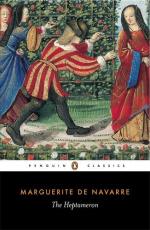Let us see, therefore, if we cannot treat the Heptameron in a somewhat different fashion from that in which any previous critic, even Sainte-Beuve, has treated it. The divisions of such treatment are not very far to seek. In the first place, let us give some account of the works of the same class which preceded and perhaps patterned it. In the second, let us give an account of the supposed author, of her other works, and of the probable character of her connection with this one. In the third, without attempting dry argument, let us give some sketch of the vital part, which we have called the framework, and some general characteristics of the stories. And, in the fourth and last, let us endeavour to disengage that peculiar tone, flavour, note, or whatever word may be preferred, which, as it seems to me at least, at once distinguishes the Heptameron from other books of the kind, and renders it peculiarly attractive to those whose temperament and taste predisposes them to be attracted. For there is a great deal of pre-established harmony in literature and literary tastes; and I have a kind of idea that every man has his library marked out for him when he comes into the world, and has then only got to get the books and read them.
Margaret herself refers openly enough to the example of the Decameron, which had been translated by her own secretary, Anthony le Macon, a member of her literary coterie, and not improbably connected with the writing or redacting of the Heptameron itself. Nor were later Italian tale-tellers likely to be without influence at a time when French was being “Italianated” in every possible way, to the great disgust of some Frenchmen. But the Italian ancestors or patterns need not be dealt with here, and can be discovered with ease and pleasure by any one who wishes in the drier pages of Dunlop, or in the more flowery and starry pages of Mr. Symonds’ “History of the Renaissance in Italy.” The next few pages will deal only with the French tale-tellers, whose productions before Margaret’s days were, if not very numerous, far from uninteresting, and whose influence on the slight difference of genre which distinguishes the tales before us from Italian tales was by no means slight.




